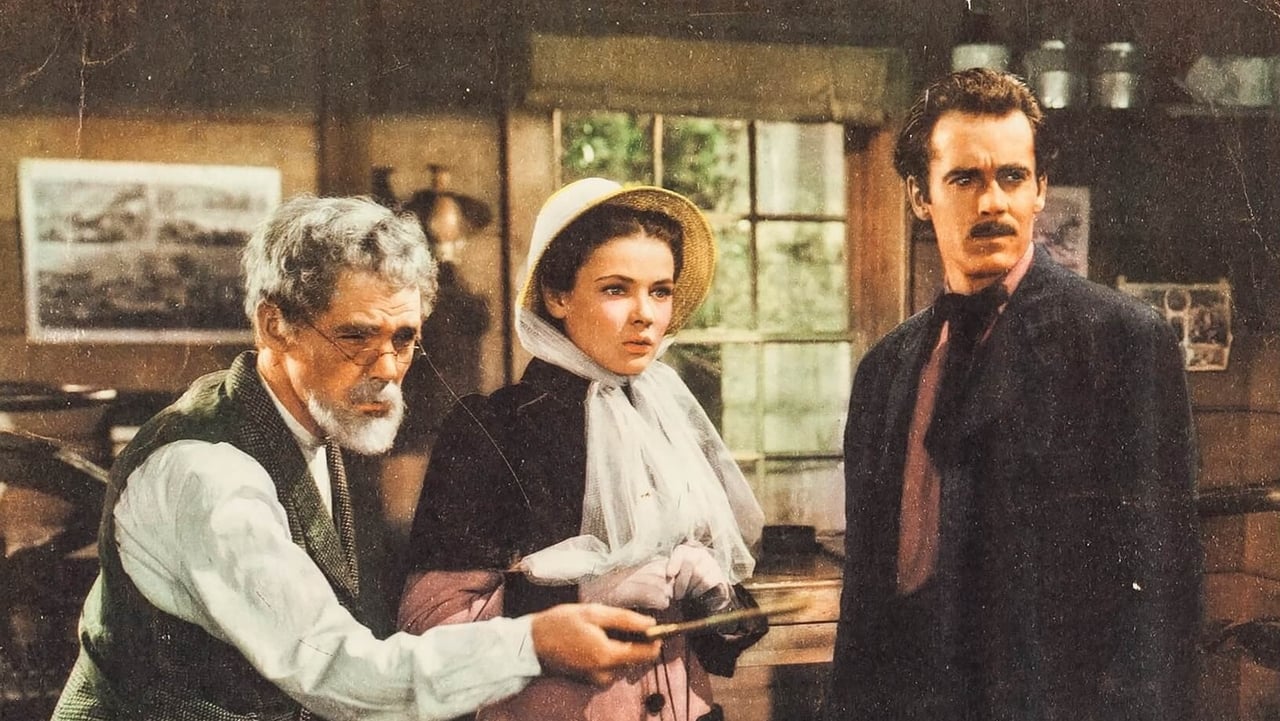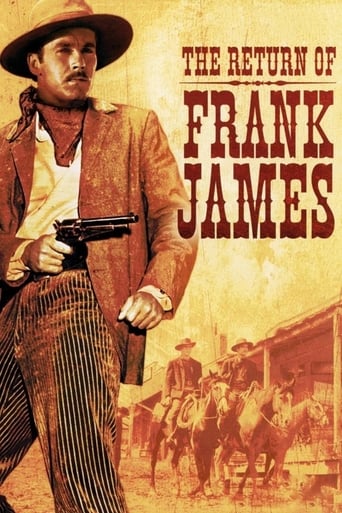

Good start, but then it gets ruined
... View Moreeverything you have heard about this movie is true.
... View MoreA terrific literary drama and character piece that shows how the process of creating art can be seen differently by those doing it and those looking at it from the outside.
... View MoreThe film never slows down or bores, plunging from one harrowing sequence to the next.
... View MoreOK, but not great. Historically fairly inaccurate, and contains some cringeworthy over-acting, most particularly from Henry Hull as Major Cobb. Henry Fonda is miscast as Frank James - it is very difficult to believe that he is an outlaw. He just seems too "nice".Still, it is fairly entertaining and gripping. Gene Tierney lights up the screen.For a good movie on the murder of Jesse James and an accurate portrayal of the demise of Robert Ford rather watch "The assassination of Jesse James by the coward Robert Ford" (2007).
... View MoreIn a "Jesse James" (1939) recap, cowardly John Carradine (as Bob Ford) shoots handsome Tyrone Power (un-credited as Jesse James) in the back. In this sequel, the outlaw hero's tobacco-spitting brother Henry Fonda (as Frank James) is understandably miffed. Basically a peace-loving man, Mr. Fonda expects the captured killer to be executed. But, when Mr. Carradine and his brother are unexpectedly pardoned, Fonda must take the law into his own hands. Fatherly Fonda leaves his quiet farm in the care of adopted teenage partner Jackie Cooper (as Clem) and slavish Ernest Whitman (as "Pinky" Washington)...Unable to keep Mr. Cooper down on the farm, Fonda reluctantly allows him to tag along. Assuming the alter egos "Ben Woodson" and "Tom Grayson", the dynamic duo spread a story about witnessing the death of Frank James, believing this will lure the Ford brothers out of hiding. In her first movie, pretty "Denver Star" reporter Gene Tierney (as Eleanor Stone) gets the word out. This successful sequel features great colorful photography by George Barnes. It's very nicely directed by Fritz Lang. The subservient, superstitious and mentally challenged "darkies" (as they are called herein) may have missed the emancipation.****** The Return of Frank James (8/10/40) Fritz Lang ~ Henry Fonda, Jackie Cooper, Gene Tierney, Henry Hull
... View MoreThe Return of Frank James is the sequel I rather annoyingly discovered was as such to the previous year's 'Jesse James', the film ending up as quite the enjoyable, subversive little western drama; a film with a good eye on the closer, more intimate notions of people coexisting and becoming both rather fond and rather influenced by both those around them as well as particular ways of life amidst this broadly told tale of peril through the hostile terrains of the west. It is a revenge film of sorts, a revenge film about an individual we're coerced into rather liking who is the bandit brother of a man recently murdered out to get even with two other brothers whom we're invited to dislike through their cowardice and hunger for fame. The film is ultimately the revising of that titular Frank James, brother to infamous Old West bandit Jesse; the likes of whom we observe murdered in the opening scene: quietly, innocently and whilst in his own house. It is a film revising of what faceless image the man has through a number of performances within the performance, delivered through an array of rather gripping dramatic set pieces and chance scenes that encompasses a fitting sub-plot of a newspaper company trying to eke out the truth of the matter in what is a reoccurring notion of getting to grips with the reality of an issue.Frank, Henry Fonda repressing his role, is in a state of existing having long since fled that life of stage robberies and terror when he hears of his brother's death. He's both living and working both peacefully and anonymously on a ranch with that of a coloured live-in assistant named Pinky (Whitman) as well as a young Caucasian named Clem (Cooper); guns seemingly hung up for good and even going out of his way now to drink natural spring water, in what is a perfect, even homely, finding of one's self at peace with his array of ethnic friends on an upstanding locale of a farm. Trouble, though, rears up and threatens to quell this haven-like existence; news filtering through of that of Jesse's death by the brothers Bob (Carradine) and Charlie (Tannen) Ford as well as their consequent pardon near enough enraging Frank to tank to his piles of hay so as to untangle his firearms wrapped neatly in a blood red handkerchief naturally coloured that way. Clem, allured by Frank's energy and anger in what are the beginnings of a particular sub-text, cannot wait to tag along with Frank to help him do his dirty-work of wrecking a retribution, although is pushed back and told to maintain the ranch by a cautious James. Fearing missing out, he follows on anyway.Frank's eventual allies arrive in the form of a press house owning journalist named Rufus Cobb (Hull), a Major turned journalist and printer, who bounces out of his offices and bounds down the street accepting and distributing his fairly well-mannered will as he asks after people and their relatives, generally instilling a sense that he knows most of those in town. When the time comes to bond with those in a saloon, he, where everyone else turns away, embraces or indeed draws attention onto those Ford brothers occupying the same place. Tossed in for good measure is the refreshing presence of Gene Tierney, here playing an out-of-towner named Eleanor Stone; a fellow journalist oh-so-desperately wanting to be accepted as such who is here looking to cover events and rejects her newspaper owning father's desire for her respective domesticisation in the form of a life as someone's housewife. James gets wind of the Ford's apparent heading out to the West, a trek which he dutifully begins so as to find them; the film's nucleus one unfolding within a filmic world wrought with frayed morals beginning with the untimely shooting of an individual in their home without them able to defend themselves and the extending of that to a gentleman forcing himself out of the more morally inclined lifestyle he has carved out so as to essentially hunt and kill two men. The director, the German Fritz Lang here operating in Hollywood with their star and studio systems having fled Europe out of running afoul of the Nazi's, constructs that of a faceless persona of the titular lead within the film through demonised public displays of show and upsets the balance by covering Frank as methodically and in the rounded manner he does.Peppering proceedings, and keeping in sync with that notion reconstructing or deconstructing a specific male character, Clem and his affection towards Frank sees him desire Frank to keep on a narrower path of violence and retribution; Clem admiring Frank as this hard-bodied, no nonsense bandit whom, upon being told he may not join him on the vendetta, gazes frustratingly at the man riding off to wage a one-man war. Later, plot development arise which threaten to see Tierney's journalist come between he and Frank, something that does not go down well with Clem inferring his homoerotic tie to the man Clem has. Harking back to Andrew Dominik's 2007 film, The Assassination of Jesse James by the Coward Robert Ford, we observe a similarly themed notion of becoming preoccupied with that of one of the James brothers; a sense of both idolisation or homoeroticism in regards to a bandit or a life of banditry, the likes of which was executed methodically there and is done so here in a cutting, efficient manner that is difficult to dislike.
... View MoreI do not know if this is true or not, but I heard from someone that in order to make Grapes of Wrath, which he really wanted to do, Fonda had to make Jesse James, which he did'nt really want to do, because they were on the same contract, and any sequels or prequels to that. But it does'nt really matter if Fonda did not want to do Jesse James or Return of Frank James, because he has such a great acting ability, which he displays on screen. I think this one is superior to Jesse James for many reasons, all of which are hard to explain. Cooper turns in a worthy role as Frank's sidekick, Clem. But don't you think that the African-American servant is kind of silly? Some people say that Carradine is not a good villain, but when that happens, just refer to McCoy and Co. to fill in that role. I love Henry Hull's character, especially his rantings and ravings in the courthouse, and also his rantings and ravings while he paces up and down the floor of his newspaper office. There isn't very many people that he does not think should be taken out and shot down like a dog, is there?
... View More